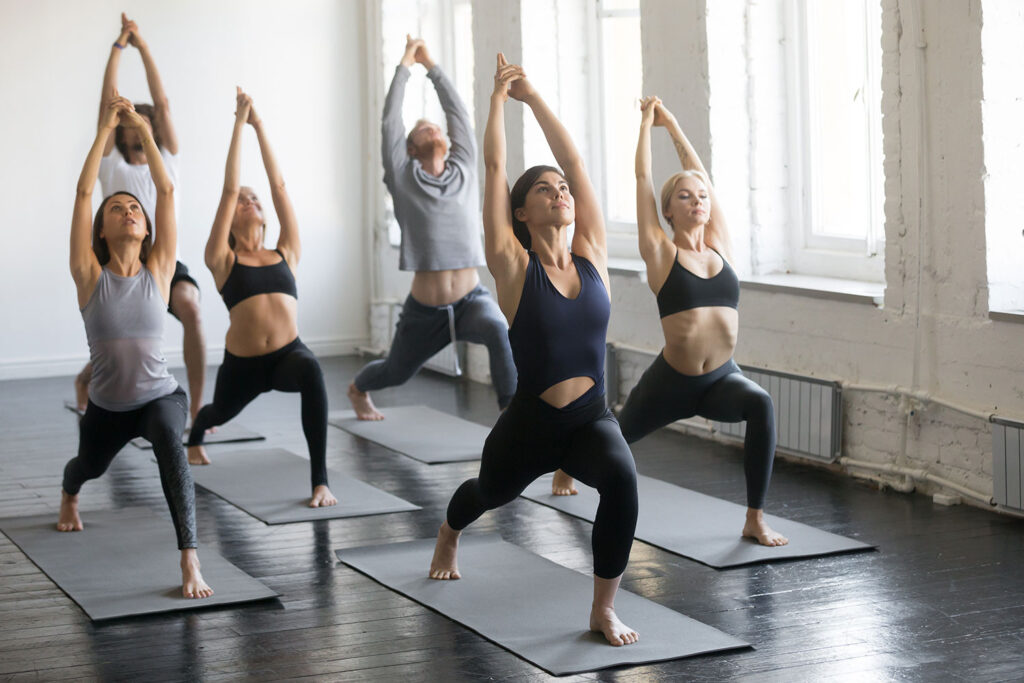9 major benefits of Yoga
Yoga encompasses a myriad of physical and mental health advantages that cater to individuals of all age groups. Furthermore, if one finds themselves grappling with an ailment, recuperating from surgery, or living with a chronic condition, integrating yoga into their treatment plan can prove to be pivotal, potentially expediting the healing process. By collaborating with a yoga therapist, patients can construct personalized regimens that seamlessly align with their medical and surgical therapies. This synergistic approach allows yoga to bolster the recovery journey, enabling individuals to navigate symptoms with heightened composure and diminished distress.
- Augmenting strength, balance, and flexibility lies at the core of yoga’s benefits. Deliberate, unhurried movements combined with deep breathing techniques facilitate enhanced blood circulation and serve as a catalyst for muscle warm-up. Additionally, assuming various poses contributes to the development of physical resilience.
Give it a try: Tree Pose Maintain equilibrium on one leg while gently placing the other foot against your calf or above the knee (ensuring not to rest it upon the knee joint) at a precise right angle. Endeavor to fixate your gaze on a singular point in front of you as you steady yourself for a duration of one minute.
- 2. Yoga emerges as a commendable solution for alleviating back pain. On par with fundamental stretching exercises, yoga proves to be efficacious in mitigating discomfort and enhancing mobility among individuals grappling with lower back pain. In fact, the American College of Physicians endorses yoga as a primary treatment option for chronic cases of this nature.
Give it a try: Cat-Cow Pose Position yourself on all fours, with your palms aligned beneath your shoulders and your knees beneath your hips. Inhale deeply, allowing your abdomen to descend towards the floor. Then, upon exhaling, draw your navel inward toward your spine, gracefully arching your back akin to a stretching feline.
3.The practice of yoga can alleviate symptoms associated with arthritis. By embracing gentle yoga routines, individuals afflicted with tender, inflamed joints often experience a reduction in discomfort. This affirmation is supported by a recent review of 11 studies conducted by Johns Hopkins.

4.The advantages of yoga extend to fostering heart health. Regular engagement in yoga sessions yields a decrease in stress levels and widespread bodily inflammation, thereby contributing to the overall well-being of the heart. Additionally, yoga addresses several contributing factors associated with heart disease, such as hypertension and excess weight.
Give it a try: Downward Dog Pose Position yourself on all fours, then tuck your toes under and gradually elevate your sitting bones, shaping your body into a triangular form. While maintaining a slight bend in your knees, elongate your spine and tailbone.
- 5.The relaxation induced by yoga can significantly enhance one’s sleep quality. Scientific research reveals that adhering to a consistent bedtime yoga routine cultivates a conducive mindset and prepares the body for deep, uninterrupted slumber.
Give it a try: Legs-Up-the-Wall Pose Situate yourself against a wall, with your left side in contact with its surface. Subsequently, gently rotate your body to the right and elevate your legs to rest against the wall, ensuring your back remains grounded on the floor and your sitting bones remain close to the wall. Maintain this position for a duration of 5 to 15 minutes.
- 6.Engaging in a regular yoga practice can lead to heightened energy levels and an overall uplifted mood. Expect an upsurge in mental and physical vitality, augmented alertness and enthusiasm, as well as a reduction in negative emotions upon establishing a consistent yoga routine.
- 7.The benefits of yoga encompass effective stress management. The National Institutes of Health underscore the scientific evidence supporting yoga’s role in fostering stress reduction, mental well-being, mindfulness, healthy eating habits, weight loss, and restorative sleep.
Give it a try: Corpse Pose (Savasana) Lie down with your limbs gracefully extended away from the body, palms facing upward. Endeavor to empty your mind as you engage in deep, intentional breaths. Embrace this pose for a duration of 5 to 15 minutes, allowing a sense of tranquility to envelop you.
- 8. Engaging in yoga fosters a sense of connection within a supportive community. By partaking in yoga classes, one can alleviate feelings of loneliness and bask in an environment that cultivates collective healing and mutual support. Even during one-on-one sessions, the profound sense of isolation dissipates as individuals are recognized as unique entities, being attentively heard and actively participating in the creation of a personalized yoga blueprint.
- 9. Yoga serves as a catalyst for nurturing enhanced self-care practices. Prominent organizations such as the U.S. military and the National Institutes of Health acknowledge and incorporate scientific findings that validate yoga’s profound value within the realm of healthcare. Numerous studies attest to the myriad benefits of yoga in specialized fields such as arthritis management, osteopenia, balance enhancement, oncology, women’s health, chronic pain management, and various other domains.
In conclusion, the realm of yoga encompasses a boundless array of physical and mental health advantages that cater to individuals across all age groups. Whether one seeks solace amidst an illness, endeavors to recover from surgical procedures, or navigates the challenges of chronic conditions, embracing yoga as an integral component of their treatment plan can potentially accelerate the healing process. By collaborating with a skilled yoga therapist, personalized and tailored plans can be devised, seamlessly integrating with existing medical and surgical therapies. This harmonious approach not only supports the healing journey but also facilitates a heightened sense of centeredness and reduced distress amidst symptoms. Through improved strength, balance, and flexibility, pain relief, arthritis symptom alleviation, heart health enhancement, better sleep quality, elevated energy levels, stress management, community connection, and the cultivation of self-care practices, yoga emerges as a transformative practice with far-reaching benefits. As the scientific community increasingly recognizes and embraces the inherent value of yoga, it paves the way for its wider adoption and integration within healthcare systems worldwide.
source : https://www.hopkinsmedicine.org

